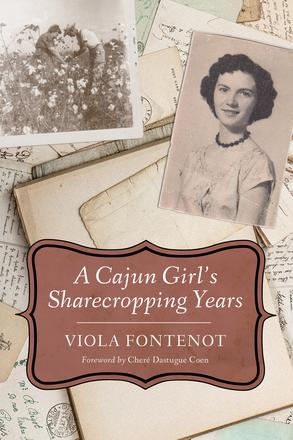
A Cajun Girl's Sharecropping Years
A female perspective of sharecropping life
Description
Winner of the 2019 Humanities Book of the Year from the Louisiana Endowment for the Humanities
Today sharecropping is history, though during World War II and the Great Depression sharecropping was prevalent in Louisiana's southern parishes. Sharecroppers rented farmland and often a small house, agreeing to pay a one-third share of all profit from the sale of crops grown on the land. Sharecropping shaped Louisiana's rich cultural history, and while there have been books published about sharecropping, they share a predominately male perspective. In A Cajun Girl's Sharecropping Years, Viola Fontenot adds the female voice into the story of sharecropping.
Spanning from 1937 to 1955, Fontenot describes her life as the daughter of a sharecropper in Church Point, Louisiana, including details of field work as well as the domestic arts and Cajun culture. The account begins with stories from early life, where the family lived off a gravel road near the woods without electricity, running water, or bathrooms, and a mule-drawn wagon was the only means of transportation. To gently introduce the reader to her native language, the author often includes French words along with a succinct definition. This becomes an important part of the story as Fontenot attends primary school, where she experienced prejudice for speaking French, a forbidden and punishable act. Descriptions of Fontenot's teenage years include stories of going to the boucherie; canning blackberries, figs, and pumpkins; using the wood stove to cook dinner; washing and ironing laundry; and making moss mattresses. Also included in the texts are explanations of rural Cajun holiday traditions, courting customs, leisure activities, children's games, and Saturday night house dances for family and neighbors, the fais do-do.
Reviews
"Her stories, although heartbreaking at times, also showcase the joie de vivre of Cajun life—the lively music and dances, the rich culture, growing up bilingual, and living close to the land. "
- Cheré Coen, Louisiana Book News, "Exciting New Releases by Louisiana Authors"
"It's a small book with a powerful story offering great insight to growing up on the Cajun Prairie. "
- Cheré Coen, Louisiana Book News, "New Releases from University Press of Mississippi"
"Viola Fontenot provides an immense service to Louisiana and women’s rural history with her work, A Cajun Girl’s Sharecropping Years, which shares her memories of growing up in a Cajun sharecropping family from 1937-1955. The work, which started as a series of essays written for a seniors' life writing class at the University of Louisiana at Lafayette, brings the world to vivid life, contributing rare insight. "
- Amy Lauters, Minnesota State University, Mankato, Louisiana History
"A fine volume for anyone with an interest in history, in South Louisiana, or in the lives of the people who less than a century ago were still living a remote, agrarian existence. "
- James Edmunds, SLEMCO Power
"With A Cajun Girl’s Sharecropping Years, Viola Fontenot offers us not a glimpse, but a panoramic view of rural Cajun life on the cusp of a radical transformation, from scratching out a meager living on the fertile fields and bayous of southwest Louisiana to the promise of modern life in mid-twentieth-century America. Many scholarly books and articles have been written about the Americanization of the Cajuns, but never before have we had such a passionate and elegant first-hand account of what those changes felt like to someone who lived through them. Fontenot tells an unromanticized tale of the struggles, heartbreak, and simple joys of growing up the daughter of hard-working, hard-living sharecroppers. It is above all the true story of Cajun culture’s survival in spite of much adversity."
- David Cheramie, Ph.D., CEO of the Bayou Vermilion District and former executive director of the Council for the Development of French in Louisiana
"As we celebrate the fiftieth anniversary of the founding of the Council for the Development of French in Louisiana, there is no better way to celebrate our Cajun culture than to follow a young girl’s journey to assimilation as she overcomes many challenges such as the language barrier, lack of family education, relative poverty, and insecurity. Tellingly, she developed the drive to obtain a good education which served her well—and got her out of the cotton fields of St. Landry Parish."
- Warren A. Perrin, attorney, skills professor at Loyola Law School, former president of the Council for the Development of French in Louisiana, and founder of the Acadian Museum of Erath